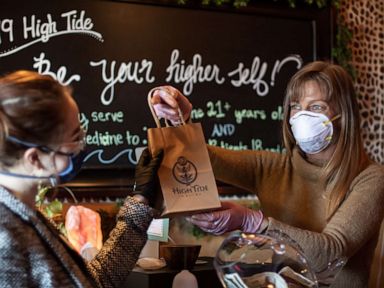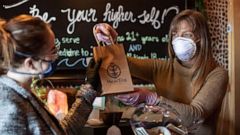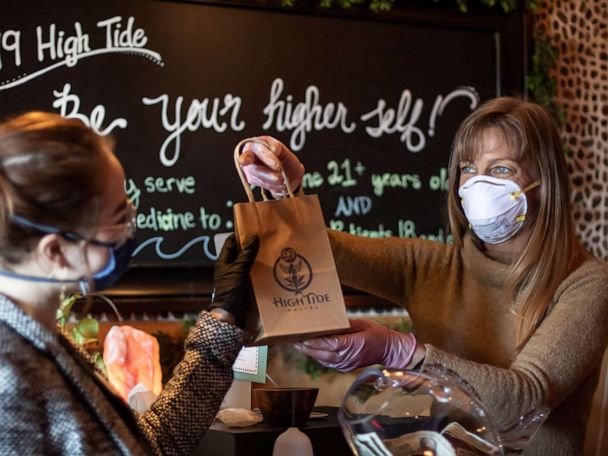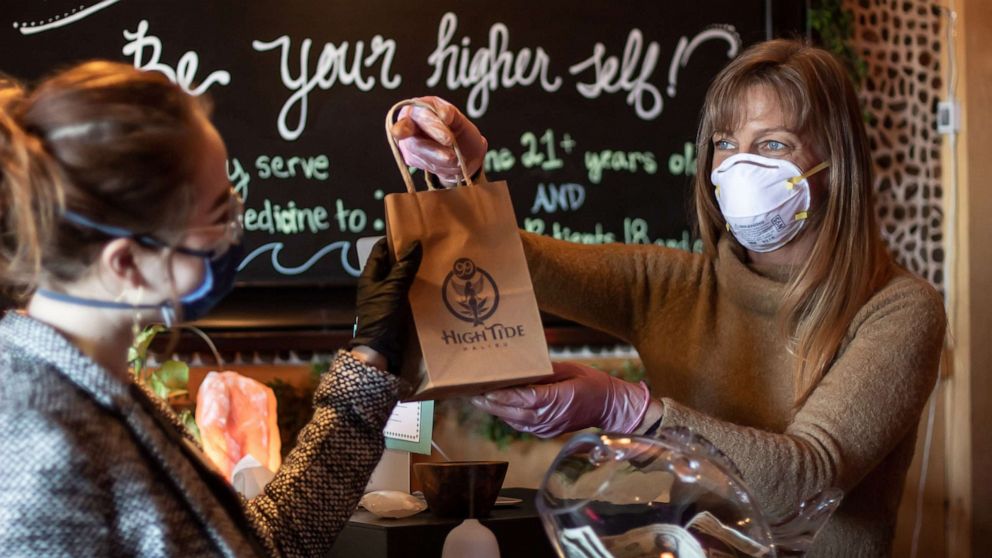





As grocery stores and pharmacies struggled to keep toilet paper and hand sanitizer on the shelves in the early days of the coronavirus outbreak, many cannabis dispensaries saw inventories sharply decline as customers feared those businesses would be deemed nonessential.
But when states and local governments began issuing stay-at-home directives, most communities that allow the sale of medical marijuana chose to include dispensaries alongside supermarkets and drugstores on lists of businesses allowed to remain open.
But because marijuana sales are still illegal under federal law, businesses operating under state statutes are barred from receiving federal assistance, including aid for small businesses in the massive $2 trillion economic recovery package signed into law last week.
Tune into ABC at 1 p.m. ET and ABC News Live at 4 p.m. ET every weekday for special coverage of the novel coronavirus with the full ABC News team, including the latest news, context and analysis.
The CARES Act includes $350 billion for the Small Business Administration to provide forgivable loans to companies with 500 or fewer employees, and the Trump administration is now asking Congress for an additional $250 billion.
The paradox of being deemed essential by one level of government but disqualified from receiving aid from another is vexing to many dispensary owners.
“How can cannabis be deemed essential right now, during this crisis, and yet not be offered the same opportunities as other businesses with stimulus packages or SBA loans?” asked Yvonne DeLaRosa Green, who co-owns 99 High Tide Collective, the only cannabis dispensary in Malibu, California. She said she doubled staffing to meet the current demand for delivery, pickup and online orders.
“We’re on the front lines,” she added. “Our cannabis consultants are risking their lives, literally, to stay open to provide medicine for people.”
For now, DeLaRosa Green said she doesn’t need the loans, but this isn’t the first time her business was passed over for federal aid.
In 2018, her home was destroyed by the Woolsey fire and her dispensary was forced to close for two weeks. But unlike other businesses in her community, hers was unable to seek federal disaster relief funds.
Because the federal government still considers marijuana a Schedule I controlled substance, banks can be prosecuted for doing business with cannabis companies, which makes access to capital much more difficult.
After the wildfires, DeLaRosa Green said her business survived because she took out private loans with high-interest rates.
In addition to dispensaries, operations that grow marijuana, conduct lab tests or sell related paraphernalia also have been ruled ineligible.
Josh Kappel, a founding partner of Vicente Sederberg, a national cannabis law firm, said he believes coronavirus has changed all businesses in America, including cannabis.
Being widely considered essential, he said, is “a very substantial and significant step forward for the industry.”
Perhaps, he added, that could lead to lasting changes within and adjacent to the industry.
“One way that the federal government could provide aid in the cannabis industry would be to pass the SAFE Banking Act and really open up banking and lending to this industry,” Kappel told ABC News.
What to know about coronavirus:
- How it started and how to protect yourself: Coronavirus explained
- What to do if you have symptoms: Coronavirus symptoms
- Tracking the spread in the U.S. and worldwide: Coronavirus map
- How it started and how to protect yourself: Coronavirus explained
- What to do if you have symptoms: Coronavirus symptoms
- Tracking the spread in the U.S. and worldwide: Coronavirus map
The SAFE Banking Act would allow banks to do business with legitimate marijuana-related businesses. The legislation passed in the House and has been introduced in the Senate.
Back in California, a state that benefits from cannabis tourism, DeLaRosa said she and her customers would be celebrating 4/20 a bit differently this year. Her store is hosting a virtual smoke-in with music, comedy and DIY classes to promote social distancing and wellness: “We are promoting stay-at-home, we are promoting de-stressing, we are promoting internal joy, and we’re promoting healthy good vibes.”
A post shared by 99 High Tide Malibu (@99hightide) on Mar 19, 2020 at 12:27pm PDT
For now, DeLaRosa Green said she doesn’t need the loans, but this isn’t the first time her business was passed over for federal aid.
In 2018, her home was destroyed by the Woolsey fire and her dispensary was forced to close for two weeks. But unlike other businesses in her community, hers was unable to seek federal disaster relief funds.
Because the federal government still considers marijuana a Schedule I controlled substance, banks can be prosecuted for doing business with cannabis companies, which makes access to capital much more difficult.
After the wildfires, DeLaRosa Green said her business survived because she took out private loans with high-interest rates.
In addition to dispensaries, operations that grow marijuana, conduct lab tests or sell related paraphernalia also have been ruled ineligible.
Josh Kappel, a founding partner of Vicente Sederberg, a national cannabis law firm, said he believes coronavirus has changed all businesses in America, including cannabis.
Being widely considered essential, he said, is “a very substantial and significant step forward for the industry.”
Perhaps, he added, that could lead to lasting changes within and adjacent to the industry.
“One way that the federal government could provide aid in the cannabis industry would be to pass the SAFE Banking Act and really open up banking and lending to this industry,” Kappel told ABC News.
What to know about coronavirus:
The SAFE Banking Act would allow banks to do business with legitimate marijuana-related businesses. The legislation passed in the House and has been introduced in the Senate.
Back in California, a state that benefits from cannabis tourism, DeLaRosa said she and her customers would be celebrating 4/20 a bit differently this year. Her store is hosting a virtual smoke-in with music, comedy and DIY classes to promote social distancing and wellness: “We are promoting stay-at-home, we are promoting de-stressing, we are promoting internal joy, and we’re promoting healthy good vibes.”


